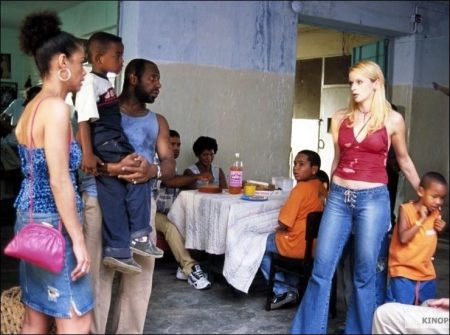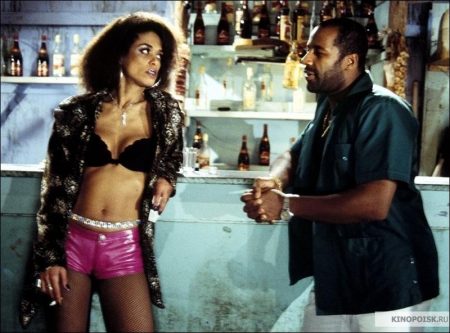Taglines: Aqui dentro ninguém é culpado. Você acredita nisso? (Inside here nobody is guilty. Do you believe that?)
Brazilian MD Drauzio Varella starts AIDS prevention in Brazil’s largest prison, Carandiru, in São Paulo, where the population is nearly double its 4,000 maximum. Doc learns from experience and mainly stories the tragic stories of hideous crimes which landed scum there and passionate dramas adding otherwise decent people. Just when he believes to leave the prisoners happy with a soccer tournament, a silly clothing line argument kick-starts a politically opportune revolt repression.
Carandiru is a 2003 Brazilian drama film directed by Héctor Babenco. It is based on the book Estação Carandiru by Dr. Drauzio Varella, a physician and AIDS specialist, who is portrayed in the film by Luiz Carlos Vasconcelos.
Carandiru tells some of the stories that occurred in Carandiru Penitentiary, which was the biggest prison in Latin America. The story culminates with the 1992 massacre where 111 prisoners were killed, 102 by Police. The film was the last thing for which the prison was used before it was demolished in 2002, one year before the release of the film.
Babenco states that Carandiru is the “most realistic film [he’s] ever made,” presenting a new kind of Brazilian realism inspired by Cinema Novo (not only is it meant to portray different sides of Brazil, but also it was shot on location and used many actual prisoners as actors). Due to this focus on portraying reality and the film’s memoir inspiration, Carandiru can be read as a docudrama or as a testimony from the prisoners.
Themes of the Film
Innocence
At one point during the film, Ebony sarcastically asks Dr. Varella if he’s noticed that all the inmates of Carandiru are innocent. All the inmates do see themselves as innocent, which speaks to the idea that the prisoners see themselves as people forced into crime. In this sense, Carandiru employs Dr. Varella as a social mediator who listens to all versions of the prisoners’ truths, allowing the audience a glimpse into their world, prompting the audience to see the incarcerated from a different perspective. By giving the prisoners a voice, Carandiru gives the prisoners a chance to tell their stories without facing judgment.
Morality
The theme of morality plays very closely to the theme of innocence in Carandiru. While some of the characters are literally innocent, others (who are guilty) commit their crimes for potentially moral reasons. Deusdete (who has no history of crime) shoots one of the men who raped his sister. Another example is Majestade, who takes the blame for his wife’s crime. Majestade, though guilty of having two wives that only sort of know about each other (and are not very happy with that), is not guilty of arson and attempted murder (which is what he is in prison for).
Law systems
While the focus of Carandiru is humanizing the prisoners, it still emphasizes the flawed Brazilian legal system and the prisoners’ own legal system. Deusdete, who murders a man for raping his sister, originally wants to report the rape to the police. However, his friends advise him not to, because the police will not take his allegation seriously, and will not look to punish the rapists. Thus, Deusdete feels the need to take matters into his own hand, creating his own “legal system.” The idea of creating a “legal system,” or “prisoner code of honor” fascinates Babenco, who stated that the code of honor was one of the most interesting aspects of the film. This highlights a problem rampant in the post-colony – that of indirect government in both the streets and the prisons.
Brutality vs. Civilization
The focus on unfair law systems comes into play during the actual massacre during the climax of the film. The prisoners end their revolt and surrender all their makeshift weapons at the request of the prison warden. However, the police force storms the complex anyhow, killing hundreds of defenseless prisoners. The police are illustrated as monsters, killing simply to kill, forcing the audience to question whether the police or the prisoners are more civil. With that, Carandiru illuminates that Brazil has two civilizations, both of which are brutal: those who live under the governmental law and those who live under their own set of laws.
Carandiru (2003)
Directed by: Hector Babenco
Starring: Luiz Carlos Vasconcelos, Milton Gonçalves, Ivan De Almeida, Maria Luisa Mendonça, Aila Leiner, Julia Ianina
Screenplay by: Hector Babenco, Fernando Bonassi
Production Design by: Clovis Bueno
Cinematography by: Walter Carvalho
Film Editing by: Mauro Alice
Costume Design by: Cristina Camargo
Art Direction by: Vera Hamburger
Music by: André Abujamra
MPAA Rating: R for strong bloody violence/carnage, language, sexuality and drug use.
Distributed by: Sony Pictures Classics
Release Date: March 21, 2003 (Brazil)
Views: 83





